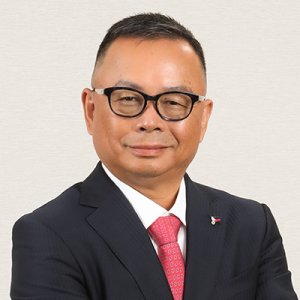JOSEPH C. SY – Chairman of the Board of Directors| Photo from Global Ferronickel Holdings, Inc. (FNI)
Global Ferronickel chairman Joseph Sy’s arrest over alleged citizenship misrepresentation sparks a Senate inquiry and national security concerns. With comparisons to the Alice Guo case, the controversy raises questions about governance and industry standards in the Philippines.
MANILA — Global Ferronickel Holdings, Inc. (FNI) chairman Joseph C. Sy has taken a voluntary leave of absence, effective August 27, following his arrest over alleged misrepresentation of citizenship. The company confirmed the move in a disclosure to the Philippine Stock Exchange.
The Securities and Exchange Commission (SEC) said it is closely monitoring the case and reminded listed firms to promptly disclose material developments, citing rules under the Securities Regulation Code and the Philippine Stock Exchange’s disclosure requirements.
Immigration case
On August 21, the Bureau of Immigration (BI) arrested Sy at Ninoy Aquino International Airport, alleging his fingerprints matched those of a Chinese national previously issued a Philippine visa and Alien Certificate of Registration. Deportation proceedings are being prepared while Sy remains detained at the BI Warden Facility in Taguig City.
Company and industry response
Global Ferronickel denounced the arrest as a “grave injustice,” insisting that Sy is Filipino. The firm cited his valid Philippine passport and previous affirmations of nationality by government bodies—including the Department of Justice, Bureau of Immigration, the Office of the President, the SEC, and the Supreme Court. (These claims reflect the company’s position and have not been adjudicated in court.)
The Philippine Nickel Industry Association (PNIA), also chaired by Sy, called for his release, describing the arrest as unlawful and warning of negative signals to investor confidence in the mining industry.
Leadership transition
Following Sy’s leave, the FNI board appointed company president Dante R. Bravo as acting chairman and created a vice chair position filled by independent director Jaime F. Del Rosario, to maintain governance continuity.
Market reaction
FNI’s stock fell 12.14% to ₱1.23 by the close on August 27 amid volatility, though it partially recovered intraday. The company assured stakeholders that operations remain stable and that contingency protocols are in place.
The “Alice Guo” comparison
A Senate panel has reportedly determined that Sy was “born and raised in China,” raising fresh scrutiny over the validity of his Philippine citizenship claims. The revelation prompted parallels with the case of former Bamban mayor Alice Guo, who was found by a Manila court to be a Chinese citizen despite presenting herself as Filipino.
Senator Risa Hontiveros, who has been pressing for a probe, underscored the similarities, saying both cases involve allegations of forged or questionable documents, entry into sensitive institutions, and national security concerns.
“This looks like Alice Guo Part 2 — pretending to be Filipino with questionable documents,” Hontiveros said earlier this week.
However, key differences remain: Guo’s case concluded with a final court ruling voiding her citizenship, while Sy’s case is still under investigation, with no judicial decision yet issued. Until a court rules, Sy’s legal status remains unresolved.
PCG delisting
The Philippine Coast Guard confirmed that Sy has been delisted from its Auxiliary roster for alleged misrepresentation of identity. Officials said vetting procedures will be tightened to prevent future lapses.
China-linked deal in 2016
In October 2016, FNI signed a cooperation agreement with China’s state-owned Baiyin Nonferrous Group, announced during former President Rodrigo Duterte’s state visit to Beijing. The deal involved potential financing for FNI’s Palawan mining operations and a proposed steel plant. Subsequent public filings have not reported full implementation of the agreement.
Potential Long-Term Impact on Philippine Governance and Industry
The unfolding case surrounding Joseph Sy highlights several key challenges for Philippine governance, particularly in terms of citizenship verification, institutional transparency, and security protocols. The Bureau of Immigration’songoing investigation into Sy’s citizenship status and the Senate’s heightened scrutiny could set important precedents for future citizenship claims involving foreign-born individuals holding sensitive positions.
Simultaneously, the Philippine Coast Guard’s decision to delist Sy from its Auxiliary underscores the need for stronger vetting procedures for honorary members of public organizations.
For the mining sector, this case could signal a potential re-evaluation of corporate governance standards and investor confidence. With FNI’s stock price fluctuations and the political fallout from Sy’s arrest, companies in similar industries may be forced to reassess their transparency practices in light of national security concerns.
Ultimately, how this case resolves will not only affect Sy personally and FNI’s leadership but may also prompt broader changes in citizenship laws, government accountability, and public trust in sensitive industries across the Philippines. The legal outcomes and political developments surrounding this case will be closely watched, as they could define future governance protocols for both the private sector and public institutions.











